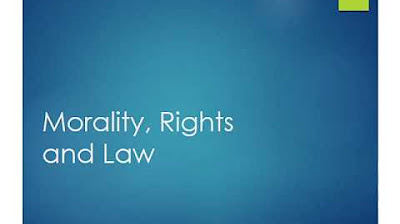La Carta dei diritti fondamentali dell'UE
Summary
TLDRThis video explores the **Charter of Fundamental Rights of the European Union**, detailing its structure, historical development, and key rights it guarantees. The Charter affirms core EU values such as dignity, freedom, equality, solidarity, and justice. It outlines individual rights, including the right to life, freedom from discrimination, and the right to work under fair conditions. The video also covers the historical journey leading to the Charter's creation and its legal significance post-Lisbon Treaty. With its clear explanation of the six main titles, the video highlights the practical impact of these rights on daily life within the EU.
Takeaways
- 😀 The EU Charter of Fundamental Rights reaffirms core values like dignity, freedom, equality, solidarity, and justice for all EU citizens.
- 😀 The Charter was initially proclaimed in 2001 but became legally binding in 2009 with the Lisbon Treaty, aligning its value with EU treaties.
- 😀 The Charter includes protections derived from important international documents like the Universal Declaration of Human Rights and the UN Convention on the Rights of the Child.
- 😀 The document consolidates rights already enshrined in EU member states' constitutions into a single, legally recognized framework.
- 😀 The Charter is structured into six titles, focusing on Dignity, Liberty, Equality, Solidarity, Citizenship, and Justice.
- 😀 Dignity is a fundamental right and precondition for the enjoyment of all other rights, as outlined in Article 1.
- 😀 The Charter ensures the right to life, prohibition of the death penalty, and protection from torture in Articles 2 and 4.
- 😀 The right to education is guaranteed in Article 14, including access to professional training and freedom in educational choice.
- 😀 The Charter prohibits discrimination in all forms, including on the basis of gender, as stated in Article 21 and 23.
- 😀 Workers' rights are emphasized, including fair working conditions and protection against unjust dismissal, as seen in Title IV on Solidarity.
- 😀 The rights outlined in the Charter are available not only to EU citizens but to all individuals within the EU, ensuring broad human rights protections across different contexts.
Q & A
What is the Fundamental Rights Charter of the European Union?
-The Fundamental Rights Charter is a document that consolidates and reaffirms common values shared by EU member states, including human dignity, liberty, equality, solidarity, and justice. It provides legal recognition and protection of fundamental rights across the European Union.
Why was the Fundamental Rights Charter created?
-The Charter was created to address the need for a unified document that would protect fundamental rights across Europe, especially as the EU shifted its focus from economic integration to also include political and social aspects.
What are the key values emphasized in the EU Charter of Fundamental Rights?
-The key values in the Charter are dignity, liberty, equality, solidarity, and justice. These values form the foundation of the six titles that structure the Charter.
What is the significance of the term 'indivisible' in the Charter?
-Indivisible means that every individual must be treated equally, with no person considered superior or inferior to another. These values apply to everyone, regardless of their social or economic situation.
What does the term 'universal' mean in the context of the Charter?
-Universal means that the rights protected by the Charter apply to all individuals, regardless of their background, nationality, or personal circumstances.
What historical events led to the creation of the Fundamental Rights Charter?
-The creation of the Charter was influenced by various historical milestones, including the Universal Declaration of Human Rights in 1948 and the Convention on the Rights of the Child in 1989, as well as the recognition that the EU needed a clear, binding legal framework for protecting fundamental rights.
When did the EU Charter of Fundamental Rights become legally binding?
-The Charter became legally binding with the adoption of the Lisbon Treaty in 2009, which granted it the same legal value as EU treaties, especially under Article 6 of the treaty.
What does Title I of the EU Charter of Fundamental Rights focus on?
-Title I of the Charter focuses on human dignity, emphasizing that dignity is a fundamental right and a precondition for the exercise of other rights. It includes articles related to the right to life and the prohibition of torture and inhuman or degrading treatment.
How does the EU Charter address equality and non-discrimination?
-Title III of the Charter includes provisions to prevent discrimination in various forms. It guarantees the right to equality and prohibits discrimination based on gender, ethnicity, or other factors. For example, Article 23 promotes gender equality, including equal pay for equal work.
What rights are outlined in Title V of the Charter, related to European citizenship?
-Title V focuses on the rights of European citizens, including the right to vote, the right to a fair administrative process, and the freedom of movement within the EU. It is important to note that these rights are reserved for EU citizens, distinguishing them from the rights applicable to all individuals.
Outlines

Этот раздел доступен только подписчикам платных тарифов. Пожалуйста, перейдите на платный тариф для доступа.
Перейти на платный тарифMindmap

Этот раздел доступен только подписчикам платных тарифов. Пожалуйста, перейдите на платный тариф для доступа.
Перейти на платный тарифKeywords

Этот раздел доступен только подписчикам платных тарифов. Пожалуйста, перейдите на платный тариф для доступа.
Перейти на платный тарифHighlights

Этот раздел доступен только подписчикам платных тарифов. Пожалуйста, перейдите на платный тариф для доступа.
Перейти на платный тарифTranscripts

Этот раздел доступен только подписчикам платных тарифов. Пожалуйста, перейдите на платный тариф для доступа.
Перейти на платный тарифПосмотреть больше похожих видео
5.0 / 5 (0 votes)






